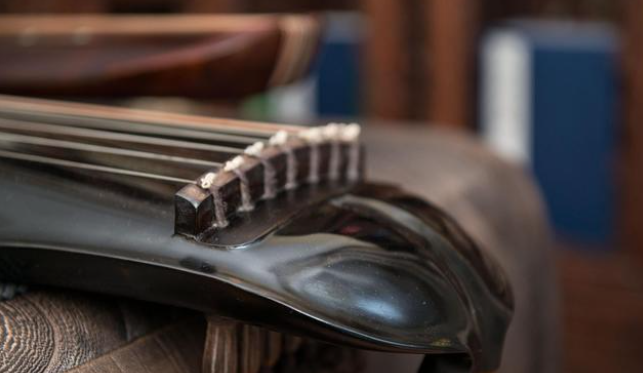The difference between Guqin "academy" and "faction"
Qin music reflects the outer appearance of the human mind, and is influenced by talent, personality, and psychological state, but its cultural understanding varies from person to person. With different understandings, the presentation styles of music are also different, and those with similar styles naturally tend to form factions.

The formation of the ancient qin school is inseparable from the influence of geographical restrictions, teachers and teachings, and different genealogy. …Eight factions; the current popular "academic school" refers to the people who receive the professional education of Guqin in the conservatory of music. At present, attitudes towards "academies" and "schools" have become polarized, and it is not uncommon to see "self-reliance on academies and contempt for rivers and lakes, and based on traditions and scorn for academies".

(The representative inheritor of Guqin art of the second batch of national intangible cultural heritage projects) Gong Yi said in an interview:
We all graduated from the Conservatory of Music, and people laughed at us as "academics". But strictly speaking, there should be "academies" and no "pies". Modern college education is still being explored. Since 1956, the Guqin major has been established in the Conservatory of Music. It has only been 60 years since the construction of these 60 years. The teaching content cannot be said to be very complete and perfect.
So how do you think about "academies" and "genres"?
First, the benefits of the college are professionalism and rigor. The basic courses of music majors in institutions and colleges are mainly music theory, solfeggio, harmony, etc. In addition, they will also draw lessons from Western staff and musical notation and conduct teaching in comparison with the traditional guqin notation. This not only standardizes the original sloppy learning rhythm, but also has a fixed grasp of the corresponding rhythm rules and modern general staff and notation, making it relatively easy to play a piano piece, and at the same time, the follow-up teaching will be taught orally. time will be greatly reduced.

Next, you can't say "genre" is unprofessional, on the contrary, it should be called "absolutely professional". "School" pursues simple and concise fingering, pays attention to lightness, simplicity, and profound artistic conception, attaches great importance to the mood of the qin, the background of people, and has its own way of grasping intonation. In terms of teaching, the main style is inherited, but the rigor is insufficient. When teachers teach, they mostly teach by words and deeds, "pointing where to play", and it is inevitable that there will be deviations that are similar to gods, and that they understand the shape but don't understand the meaning. Ambiguous positions such as "seven emblems and six points" and "ten emblems and eight points" will be different due to the qin masters' respective qin training and aesthetics during learning, and the styles of each qin school are also reflected. .
Furthermore, with the development of modern information technology, convenient transportation, and the sharing of pictures, texts and audios, without the influence of geographical restrictions and lack of resources, the musicians have more convenient learning conditions. has become everyday. There are many guqin masters in the qin world who have combined the essence of various schools, learn from each other's strengths and complement each other's shortcomings, and form a distinct and independent style.
Finally, the "academy" has a professional and rigorous that cannot be underestimated, but in terms of mood and rhythm, it is afraid that it is not comparable to the inheritance of the "genre". Under modern music aesthetics, being skilled in rigor inevitably lacks emotion, and is too free and out of tune, and the competition between "academy" and "genre", which offset each other, deviates from the original intention of learning the piano.
High-end art must have a social foundation, and there is a limit to the height of the foundation. Rejecting the shoddy creation of pseudo-traditional and arty people in the society, and truly spreading the Guqin culture is the effective inheritance and development of the tradition.
 渝公网安备 50010702504639号
渝公网安备 50010702504639号